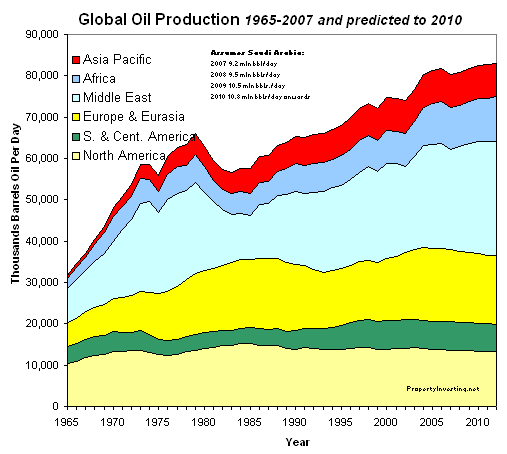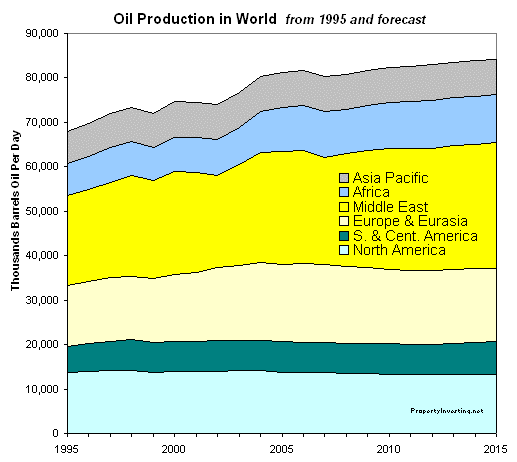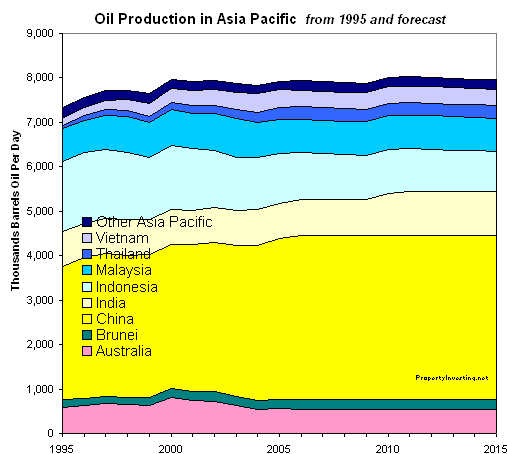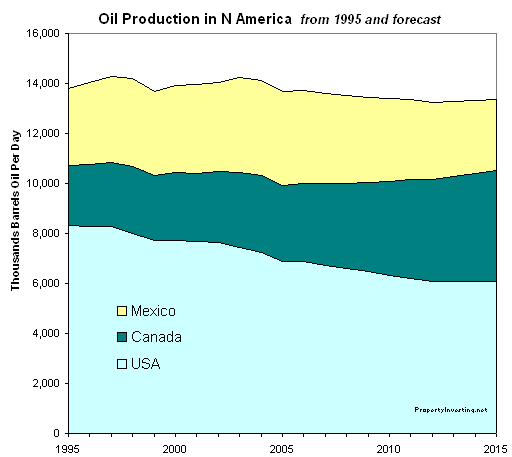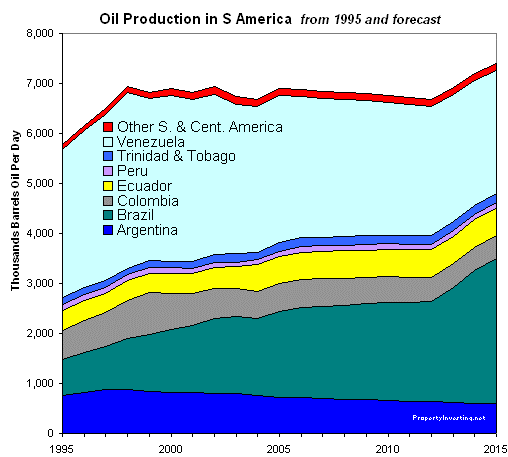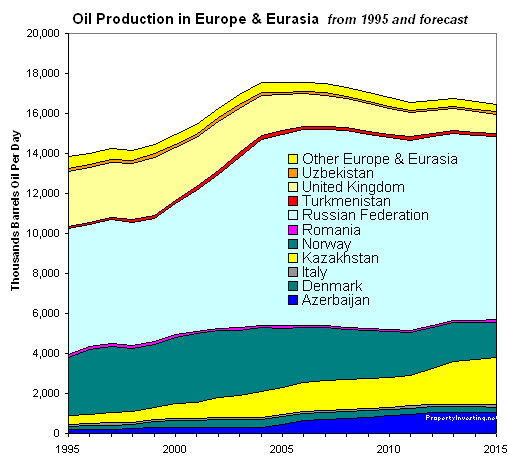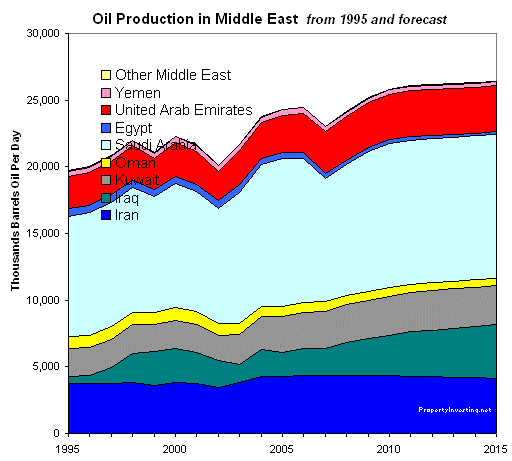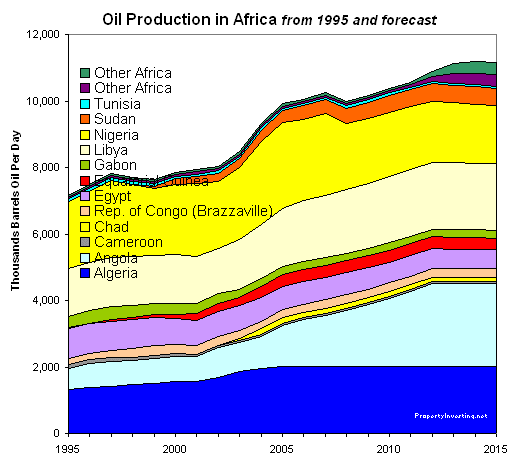197: World Energy Report - where to invest in property
06-08-2008
PropertyInvesting.net team
As we have been warning since June 2007, oil prices will rise to $125/bbl by end of 2008. They have already done so - this should be absolutely no surprize to our regular website visitors. We have a unique model that has forecast oil production up until 2015 based on our global industry experience, this oil demand model is based on oil prices of $125/barrel. As you can see below, there is a big imbalance between supply and demand suggesting oil prices will rise further. It is difficult to predict how high these oil prices may rise, but we conservatively predict $150//bbls by end 2008 and $200 by end 2009 - unless there is a significant recession in the western developed economies (USA and Western Europe).
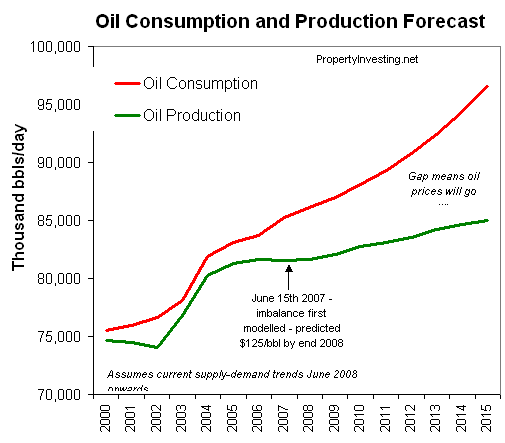
The reason why we want you to be ahead of the game here is because all countries with growing oil exports should have property prices that are either stable or rising. Oil countries with increasing oil imports will find life difficult and property prices will be affected. The main growing oil centres are:
- Canada
- Brazil
- Angola
- Iraq
Brazil and Canada, along with Norway, UAE, Saudi Arabia, Kuwait, Russia, Qatar and Brunei are some of the main beneficiaries of high oil prices. Our analysis is unqiue, based on detailed numerical analysis and future predictions. We see oil bubbling along a plateau from now on - slightly rising - but ot by enough - the only way demand will fall to this bubbling plateau is if oil prices rise. We believe they would have to rise to $200/bbl to have a significant affect on demand - and alter people's driving and consumer behaviours. Part of the reason why demand is so inflexible is because of the already vey high gasoline tax in Western economies, as well as state subsidies in countries like Venezuela, Pakistan, India, Bangladesh and Indonesia. And to date there is no alternative to diesel trucking and gasoline car usage - alternatives are 5-10 years away.
For further details of supply-demand and analysis of where to buy real estate in a high oil price world, refer to our Special Reports below:
191: Oil Price Update and Real Estate
187: Real Estate and the commodities super-cycle
186: Oil price starts to skyrocket as predicted - how to profit
180: Oil prices continue to skyrocket
172: Make serious money - best investment sectors
169: Oil supply crunch begins… protect yourself
168: Alarm bells ringing – oil price shock now on the horizon
163: Making Serious Money as asset prices plateau – resources and property
161: Resources winners and losers - ranked list for property investors
160: Find out the winners and losers in the biggest oil boom in history - about to happen...
159: Massive oil boom - the winners and losers - be prepared
158: Supply and demand scenarios - oil boom and the property investors insights
157: Impact of "Peak Oil" for Property Investment
151: Oil price $125 / bbl and rising…how to take advantage in property
150: Peak Oil shortly due to be reach – unique insights for a property investor
148: Take advantage of the oil/gas/coal boom – key insights
This oil price boom will dramatically affect the economic landscape and we urge you now to read all our previous special reports on the topic to position your portfolio to take advantage of this opportunity and not get caught out in an areas of declining economic prosperity because of negative exposure to high oil prices. Please take our predictions very seriously.
- UK: If you live in the UK, Aberdeen is the most positively exposed city to high oil prices, followed by London and NE Scotland (Stonehaven, St Fergus, Dundee, 50 mile radius of Aberdeen). Almost all other areas will be negatively impacted. Remote country areas distant from London will suffer more than most (e.g. west Wales).
- USA: In the USA, Texas (Houston, Austin, Fort Worth, Dallas, Irving, Galveston) and Bakserfield in California will be positively impacted. Wyoming, NW Colorado, Rockie Mountains belt and Oklahoma.
- Canada: A real winner - Calgary, Edmonton, Fort MacMurray - and oil sands boom areas
- Norway: is a real winner - Oslo, Stavanger, Bergen will be hugely propering in future.
- Russia: Moscow and St Petersburg and oil towns in Siberia and the Urals.
- UAE: Dubai, Abu Dhabi - anywhere in the country
- Angola: Luanda
- Brunei: Darasalam
- Oman: Muscat
- Saudi Arabia: all cities
- Qatar: Doha - a winner (massive LNG expansion)
- Egypt: Cairo will prosper because of oil/gas and proximity to Middle East funding
- Libya: Tripoli - massive oil wealth increase
- Algeria: Gas/LNG and oil revenues
Avoid all areas that rely on long distance car travel or plane travel unless they are a rich offshore banking haven - e.g. avoid Seychelles, Gambia, Maldives, New Zealand, Hawaii, Soloman Islands).
Interestingly we still believe oil production will increase slightly if there are no major wars, but it will be erratic, problematic, unpredictable and bumpy. A wave of new oil arrives in 5 years time in Brazil, possibly Ghana and is currently expanding in Iraq, Angola, Saudi to a certain extent and Canada. Libya may also expand production. But many countries will see declining oil production - like Mexico, Norway, USA (until 2012 when it will stabilise), Syria and the UK - the steepest decline being in the UK. Russia reached it's peak oil production August 2007 and went into decline January 2008 - heading for ca. 3% per annum decline per annum from now on. That said, they produce a massive 9 million bbls/day, so the revenues for both oil and gas combined at $125/bbl are about $1.8 trillion per annum - so the decline will have almost no impact on their finances. Russia is a winner. Norway - despite its decline is a huge winner. 5 million people with $0.4 tillion revenues! That's $80,000 per person per year! If house prices dont rise in Norway - we'll be eating our hats!
Kuwait, Brunei and Qatar will become fabulously wealthy. Their per head revenues are staggering - up to $125,000 per person per year! How can property prices drop when revenues have gone up ten fold in ten years!
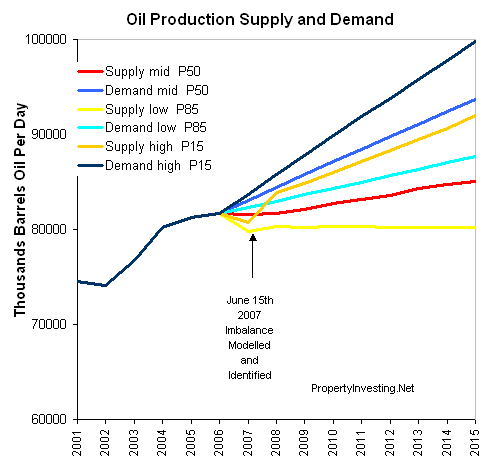
The main reasons for the oil price rising we believe are:
- Lack of adequate investment in surface-pipeline and wells infra-structure after oil prices dropped to $10/bbl in 1999 in all countries (only rising to $25/bbl in 2002)
- Diminishing new reserves discoveries in the last 30 years - since the Alaskan and North Sea giant oil discoveries in the 1970s
- 93% of oil reserves are now in state control - these countries have little incentive to expand production (note 70% of reserves were open to western oil companies back in 1970)
- Moderate geopolitical and security tensions add to oil prices (e.g. Nigerian internal attacks, Iran tensions)
- Speculation - the market expects prices to rise and hence investors have been purchasing oil futures to hedge or profit from prices rising (note: airlines tend to hedge to mitigate risks against higher oil prices)
- Declining dollar - since end 2007, the dollar has dropped 25% hence one would expect oil prices to rise by 25% to compensate in this 6 month period
- OPEC control - the inability (or lack of organisational will) of OPEC to pump more oil when supply is weak and demand is strong - we believe their is no meaningful spare capacity left...
- US refinery maintenance, refinery issues and complexity of oil products specifications in different US states (not thought to have a large impact, but drives gasoline prices higher in the USA)
- Subsidies - many countries subsidize gasoline and fuel prices or have no tax on fuel (e.g. Iran, Pakistan, India, China) - this creates higher demand than would normally be the case
- Skills and equipment shortage in the oil industry leading to delayed projects, delayed new oil production and higher decline rates in countries (or slower production growth rates in countries with expanding oil production)
- Massively expanding numbers of cars/trucks on the roads in all countries, particularly China, India and other developing countries
- Lack of planning, innovation, political will and industry and political leadership in driving new renewable forms of energy that can replace oil (e.g. electric cars, nuclear power)
- Environmental constraints and climate change concerns prevent new projects going ahead - and delay other projects - hence new oil growth lags the decline of older fields
- Accelerated oil production in western countries (North Sea, USA) has now led to steep declines - mature oil fields in Middle East and developing countries do to have the capacity to increase rates to make up for shortfalls.
- New oil discoveries are in inhospitable, expensive development areas (deepwater, arctic, rough seas) - it takes many years to develop and costs, complexity and risks are high.
There are many arguments for and against these points. Overall, we believe that oil demand will continue to outstrip supply if oil prices stayed at $125/bbl for the next 4 years, and hence we believe oil prices will rise to $200/bbl. Whether oil prices stay there or not would depend on whether new oil sources came on stream or not. Whilst Angola, Iraq and Brazil are rays of light in an otherwise gloomy production forecast, we believe these new oil expansions will be too little too late to prevent skyrocketing oil prices. And that it is not speculation driving prices higher - it is demand/supply fundamentals. Park the "smoke and mirrors" - review our analysis below and make up your own mind.
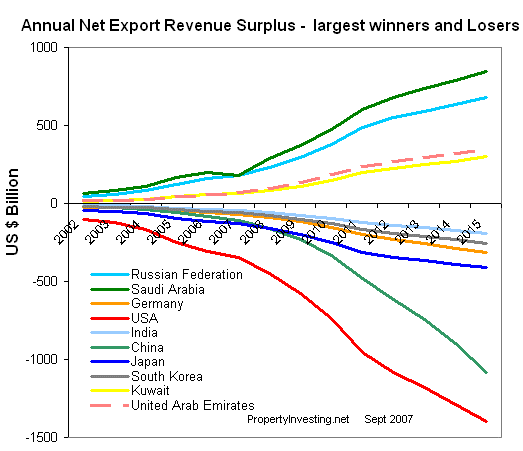
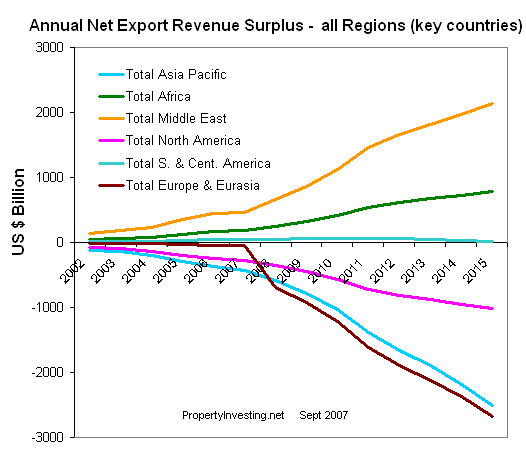
So don't say we did not warn you. Don't say we do not give a further stearn warning. Don't invest in Italy, Greece or South Africa. Rather invest in the countries described above to protect the downside and capture the upside. Oslo, St Petersburg, Edmonton, Fort MacMurray and Aberdeen are some highlights. Expect higher inflation, higher interest rates and house price declines in much of the western developed world. Roll on higher property prices in the areas we have suggest - in oil exporting nations.
We hope you have found this special report of benefit. Please contact us on enquiries@propertyinvesting.net if you have any comments-questions.
